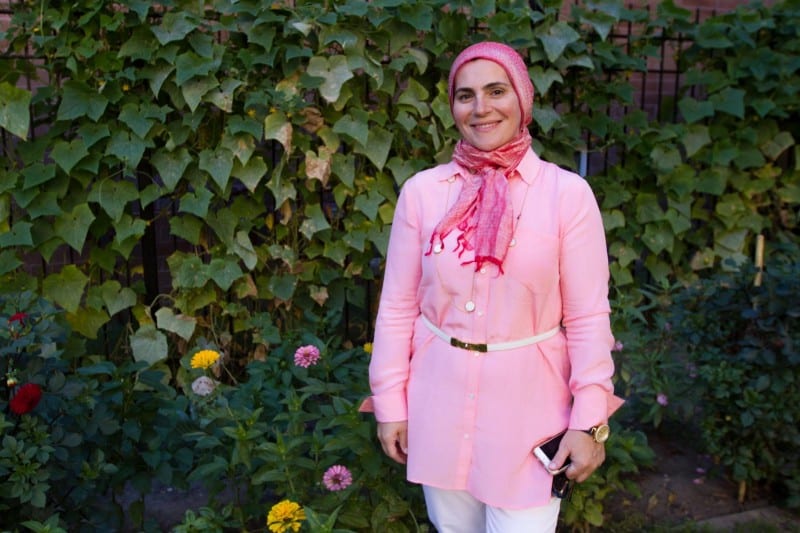
Suzanne Akhras Sahloul es fundadora y directora ejecutiva de la Red Comunitaria Siria, que ayuda a los refugiados sirios a encontrar un nuevo hogar en la zona de Chicago.
Suzanne Akhras Sahloul es fundadora y directora ejecutiva de la Syrian Community Networkque ayuda a los refugiados sirios a encontrar un nuevo hogar en Chicago. Akhras Sahloul nació en Homs, la tercera ciudad más grande de Siria, y llegó a Estados Unidos a los 10 años. Representó a la comunidad sirio-estadounidense en el Foro Mundial de la Diáspora del Departamento de Estado de Estados Unidos en 2011 y 2013.
SCN cuenta con 140 familias de refugiados sirios, cerca de 600 individuos, que ahora viven en el área metropolitana de Chicago. Illinois acogió a 10.864 refugiados de los siete países especificados en la orden del presidente Trump del 27 de enero desde 2007. Alrededor de la mitad de estos refugiados se establecieron en Chicago, mientras que cientos de otros encontraron hogares en los suburbios del oeste y del norte. Chicago Ideas Week clasificó a SCN como uno de los 7 organizaciones de Chicago que están mejorando la ciudad.
Borderless habló con Akhras Sahloul sobre la comunidad de refugiados sirios de Chicago y el veto migratorio de Trump.
Sin fronteras: ¿Qué necesita saber la gente sobre la situación de los refugiados sirios?
Sahloul: Desde 2011, asistimos a la peor catástrofe humanitaria de nuestras vidas. Más de 4,8 millones de refugiados sirios se han registrado en el ACNUR [la agencia de la ONU para los refugiados] y hay otros 3 millones que no están registrados y otros 2 millones que son desplazados internos. Es decir, la mitad de la población siria está desplazada.
Se trata de la crisis de refugiados más documentada de la historia, y aun así el mundo no reaccionó durante mucho tiempo. Tardó poco Alan Kurdi será arrastrado hasta la orilla [en 2015] para que el mundo empezara a prestar atención. Tuvimos una respuesta increíble aquí en Chicago. La gente quería ayudar; fue realmente increíble. Pero entonces el atentado de París ocurrió en [noviembre de 2015] y de nuevo se retrató a los refugiados sirios de forma negativa.
Cuando se relaciona a los refugiados con el ISIS y los problemas de esta guerra, les estamos haciendo responsables de una guerra de la que huyeron como civiles. Estos refugiados no son responsables de lo que ha ocurrido en Siria. En la mayoría de los casos, tuvieron que huir de sus hogares con lo puesto.
Sin fronteras: ¿Cómo se ha tratado a los refugiados sirios fuera de Estados Unidos?
Sahloul: Si nos fijamos en la historia, Siria recibió refugiados de muchos conflictos: Armenios, judíos durante la Segunda Guerra Mundial, libaneses, iraquíes y somalíes. Todos han sido acogidos en Siria a lo largo de los años y especialmente en tiempos de guerra. Pero hoy en día, encontramos este terrible trato a los sirios en países cercanos, como Jordania y Líbano, donde a menudo viven sin servicios y sin vivienda, en una auténtica miseria.
Sin fronteras: Cómo ha reaccionado la comunidad de refugiados sirios a la orden de veto migratorio del presidente Trump?
Sahloul: Algunas de las familias sienten miedo, porque corre el rumor de que los refugiados que están aquí volverán a ser revetados. Las familias también sienten que se les trata injustamente. ¿Qué han hecho para recibir este trato injusto? Solo quieren centrarse en aprender inglés, conseguir un trabajo, pagar el alquiler a tiempo y asegurarse de que sus hijos van a la escuela. No son diferentes de usted o de mí.
Sin fronteras: ¿Por qué debe Estados Unidos ayudar a los refugiados sirios?
Sahloul: Estados Unidos es el único país del mundo que puede absorber un gran número de personas desplazadas. Los refugiados sirios también tienen algo que aportar al tejido social de Estados Unidos. Son personas educadas, trabajadoras y emprendedoras, y ya existe una comunidad preestablecida en este país para ayudarles.
La Syrian Community Network empezó con la idea de que la comunidad sirio-estadounidense de aquí puede proporcionar y acoger a los recién llegados. Hoy, muchas ciudades están haciendo lo mismo que Chicago. La gente suele decir que los refugiados vienen a vivir del sistema, pero viendo nuestra organización se ve que cuidamos de los nuestros. SCN está financiado al 100% por la comunidad. Por ejemplo, en el último año y medio hemos ayudado a 95 familias a pagar el alquiler gracias a $200.000 en donaciones solo de la comunidad. Estos refugiados no son una carga para nadie, son una bendición.
Pero si nos fijamos en la capacidad de Estados Unidos para ayudar a los refugiados sirios, esta es una crisis que no empezó con Trump. Empezó con Obama, a quien realmente culpo de esta situación. Aceptó dejar entrar a 10.000 refugiados sirios de los cinco millones de desplazados. En términos de números y magnitud de alcance, no es nada. Todo el mundo lo aclama como uno de los mejores presidentes, pero en la escena internacional fue un presidente débil. Le falló al pueblo sirio y a sus hijos. Miren a Alepo y verán que es toda la prueba que necesitan.
Sin fronteras: ¿Cómo ha reaccionado el ciudadano estadounidense ante la llegada de refugiados sirios?
Sahloul: La Red de la Comunidad Siria tiene delegaciones en todo Estados Unidos y nuestros voluntarios son de todas las nacionalidades y religiones: Musulmanes, no musulmanes, judíos, católicos, presbiterianos, no confesionales. Es extraño y reconfortante ver a toda esta gente dedicar dos o tres horas a la semana a una familia que lo ha perdido todo por culpa de la guerra en Siria.
En mi opinión, este tipo de voluntariado es un testimonio de la bondad del pueblo estadounidense de todas las creencias e identidades. Se puede ver que las comunidades se están movilizando para acoger a los refugiados sirios. Por cada comentario terrible contra los refugiados que recibimos en Internet, tenemos cientos de voluntarios dispuestos a poner en práctica sus creencias.
Esta entrevista ha sido condensada y editada para mayor claridad.
